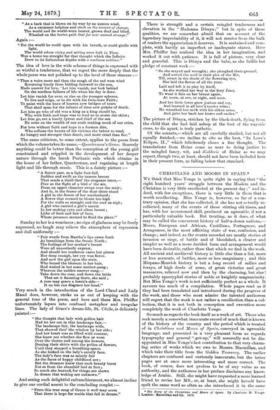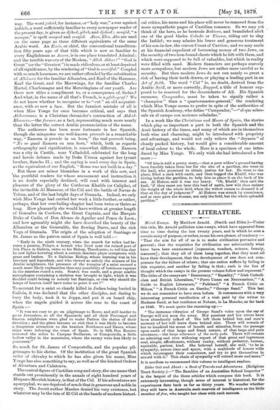CHRISTIANS AND MOORS IN SPAIN.*
WE think that Miss Yonge is quite right in saying that " the eight hundred years' struggle between the Moslem and the Christian is very little recollected at the present day ;" and in- deed, with few exceptions, there is very little in them that is worth recollecting. Miss Yonge is, however, so far of a con- trary opinion, that she has collected, if she has not actually re- collected, many of the events of those stirring old times, and has, with her accustomed skill, produced an agreeable, if not a particularly valuable book. But treating, as it does, of what may be called the concurrent history of half-a-dozen nations,— Moors, European and African, Castilians, Portuguese, and Arragonese, in the most afflicting state of war, confusion, and change ; and indeed, as the events recorded are mostly stories of invasion or siege, of battle and of bloodshed, a clearer and simpler as well as a more decided form and arrangement would have been desirable, rather than that which we find in the work. All ancient and mediaeval history is little else than a list, more or less accurate, of battles, more or less sanguinary ; and this Hispano-Moorish history is but a long record of sallies and forays, of high deeds of arms, of great victories and great massacres, relieved now and then by the charming, but alas ! probably apocryphal stories of noble or knightly magnanimity. But Miss Yonge's work is not sufficiently perfect as a whole. It savours too much of a compilation. Whole pages read as if they had been translated and introduced during the progress of the work, and those who most admire the talented authoress will regret that the work is not rather a recollection than a col- lection, that it is not both in conception and execution more completely the work of Charlotte Yonge.
So much as regards the book itself as a work of art. Those who seek merely a somewhat inaccurate record of much that is known of the history of the country and the period which is treated of in Christians and Moors of Spain, conveyed in agreeable language, and presented in a very pleasant form as regards typography and general " get-up," will assuredly not be dis- appointed in Miss Yonge's last contribution to that very charm- ing series of works which we owe to Messrs. Macmillan, and which take their title from the Golden Treasury. The earlier chapters are confused and curiously inaccurate, but the latter pages are at once more interesting and more correct. The book, of course, does not profess to be of any value as an authority, and the authoress in her preface disclaims any know- ledge of Arabic. Still, she might have requested a more learned friend to revise her MS., or, at least, she might herself have spelt the same word as often as she introduced it in the same
• The Story of the Christians and Moors of Spain. By Charlotte M. Forge• London : Macmillan and Co. 1878. way. The word jandd, for instance, or " holy war," a war against: infidels, a word sufficiently familiar to every newspaper reader of the present day, is given as djihed, giheb, and cljehad ; masjid," a mosque," is spelt mesgad and musjid. Abou, Ebu, Abu are used on the same page as three different equivalents of the same Arabic word. An Emir, or chief, the conventional translitera- tion fifty years ago of that title which is now sa familiar to every Englishman as Ameer, is in one place translated Admiral ; and the terrible war-cry of the Moslem, "Allah Akbar!" "God is Great" (or the " Greatest ") is made ridiculous, or at least deprived of all significance, by the rendering of " God is merciful." Coupled with so much looseness, we are rather offended by the substitution of Al/antra for the familiar Alhambra, and Karl of the Hammer, Karl the Great, and the Meerwings, for the familiar Charles Martel, Charlemagne and the Merovingians of our youth. Are these new titles a compliment to, or a consequence of, Sedan P And what, in the name of all that's French, is a pfalz-graf ? We do not know whether to recognise or to " cut " an old acquaint-
ance, with so new a face. But the funniest mistake of all is when Miss Yonge for once becomes critical, and says that
Abderraman is a Christian chronicler's contraction of Abd-el- Bhaman,—the former, as a fact, representing much more nearly than the latter the correct Arabic pronunciation of the name. The authoress has been more fortunate in her Spanish,
though she misquotes one well-known proverb in a remarkable way, " Zamora si prende in un hora," the real proverb being,
"No se gang Zamora en una hora," which, both as regards orthography and signification, is somewhat different. Zamora, was a city in Castile, near Valladolid, celebrated for the long
and heroic defence made by Dofia Urraca against her tyrant brother, Sancho II. ; and the saying is used every day in Spain, as the equivalent of our English, " Rome was not built in a day."
But these are minor blemishes in a work of this sort, and the youthful readers for whose amusement and instruction it is no doubt especially destined, will read with interest and pleasure of the glory of the Cordovan Khalifs (or Caliphs), of the invincible Al Mansour, of the Cid and the battle of Navas de Tolosa, and of the last bright days of Granada. Indeed, we only wish Miss Yonge had carried her work a little further, or rather,
perhaps, that her concluding chapter had been twice or thrice as long. How pleasantly she would have written at greater length of Gonsalvo de Cordova, the Great Captain, and the Marquis Duke of Cadiz, of Don Alonso de Aguilar and Ponce de Leon ; and how agreeably might she have described the beauty of the Alhambra or the Generalife, the flowing Darro, and the rich Vega of Granada. The origin of the adoption of Santiago or St. James as the patron saint of Spain is well told:— "Early in the ninth century, when the search for relics had be- come a passion, Pelayo, a hermit who lived near the ruined port of Iria Flava in Galicia, came to his Bishop, Theodomiro, to tell him that be saw lights hovering about a certain desolate place overgrown with grass and bushes. To a Galician Bishop, whose learning was in hie breviary and legendary, and who viewed as unholy the science of his Arabic neighbours, the presence of the remains of a saint seemed a mach more likely explanation than any possibility of luminous vapours in the marshes round a ruin. Search was made, and a great marble sarcophagus containing a skeleton was brought to light, which it was decided could belong to nobody but Santiago, or else why should the lamps of heaven itself have come to point it out ?"
To account for a saint so clearly killed in Judaea being buried in Galicia, it was declared that the other disciples, not daring to bury the body, took it to Joppa, and put it on board ship, when the angels guided it across the seas to the coast of Spain :—
"It was not easy to go on pilgrimage to Rome, and still harder to go to Jerusalem, so all the Spaniards and all their Provençal and Gascon neighbours were glad to make Padron the shrine of their devotion ; and the place became so rich that it was likely to become a dangerous attraction to the heathen Northmen and Danes, whose ships were infesting the coast of Spain. So in 829, Don Ramiro removed the relics to Campus Stellaram, or Compostella, a little hollow valley in the mountains, where the enemy were less likely to penetrate."
So much for St. James of Compostella, and the popular pil- grimages to his shrine. Of the institution of the great Spanish order of chivalry to which he has also given his name, Miss Yonge has also something to say, as well as of the kindred Orders of Alcantara and Calatrava.
The central figure of Castilian song and story, the one name that stands out prominently in the annals of eight hundred years of Hispano-Moorish history, is that of the Cid. If his adventures are apocryphal, we are deprived of much that is generous and noble in story. The Jesuit author Masden denied his very existence, but whatever may be the fate of El Cid at the hands of modern histori- cal critics, his name and his place will never be removed from the
more sympathetic pages of Castilian romance. So we may yet think of the hero, as he bestrode Babieca, and brandished aloft one of the good blades Colada or Tizona, riding out to slay the Infidel; we may admire his brave and generous treatment of his son-in-law, the craven Count of Carrion; and we may smile at his financial expedient of borrowing money of two Jews, on the security of two iron-bound chests which he left with them, and which were supposed to be full of valuables, but which in reality- were filled with sand. Modern financiers are perhaps scarcely
more scrupulous, but modern Jews are rather more careful as to security. But then modern Jews do not run nearly so great a
risk of having their teeth drawn, or playing a leading part in an Act of faith. The word " Cid " is, no doubt, derived from the Arabic Said, or more correctly, Sayyad, a title of honour sup- posed to be reserved for the descendants of Ali. His Spanish surname, Campeador, must be taken to signify rather a " champion " than a "quartermaster-general," the rendering which Miss Yonge seems to prefer in spite of the authorities of
the Spanish Academy, who define " Campeador,"—" el que sabre- sale en el campo con acciones senaladas."
In a work like the Christians and Moors of Spain, the stories
which play so important a part in both the Spanish and the Arab history of the times, and many of which are in themselves both wise and charming, might be introduced with propriety and advantage, and would not only relieve the " dryness " of
closely packed history, but would give a considerable amount of local colour to the whole. Here is a specimen of one intro- duced by Miss Yonge. We only wish she had introduced a few- more :— "Of him is told a pretty story,—that a poor widow's ground having been forcibly taken from her for the site of a pavilion, she went to the kadi, who promised to obtain justice for her. He went to the place, filled a sack with earth, and then begged the Khalif, who was sitting before the pavilion, to help him to place it on the back of his ass. Al Hakem said it was too heavy. 'Oh, Khalif,' then said the kadi, 'if thou canst not bear this load of earth, how wilt thou endure the weight of the whole field, when the widow comes to demand it of thee at the day of judgment r Al Hakem was struck by conscience, and at once gave the woman, not only the field, but the whole splendid pavilion."



































 Previous page
Previous page